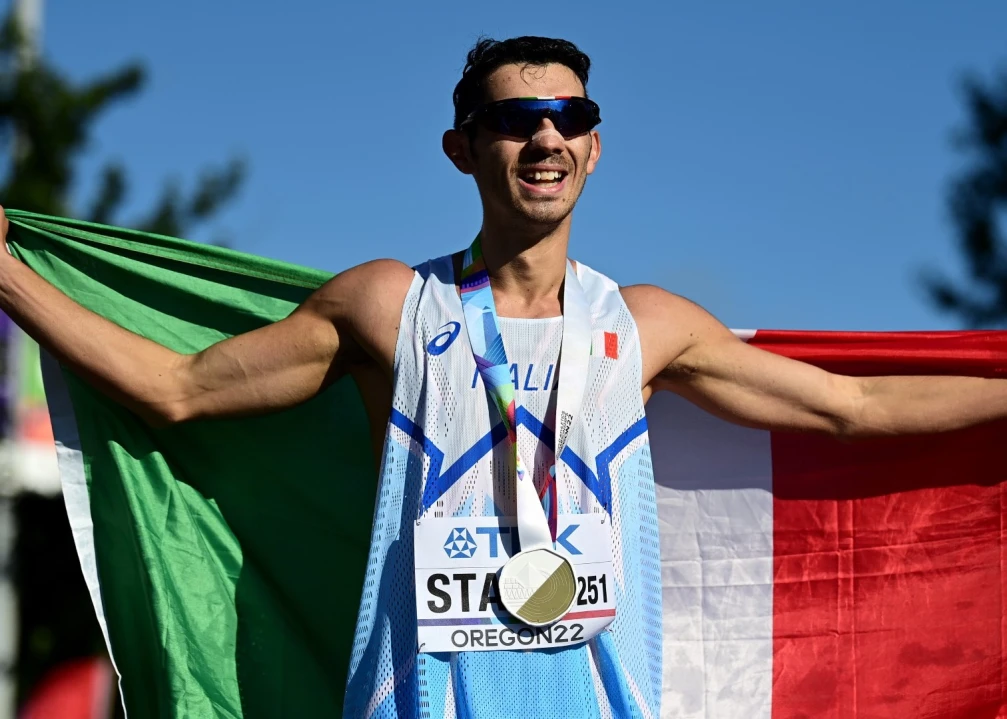A year ago, at the Tokyo Olympic Games, Italy discovered that it was an athletics powerhouse, the queen of Olympic sports. Never in the history of athletics had the "bel paese" managed to win five gold medals in an Olympic edition, and above all, the feat had never succeeded in the symbolic race of the Olympics, the 100 meters (with Marcell Jacobs) and the 4x100 relay (Jacobs, Patta, Desalu and Tortu), a symbol of a nation's sporting power.
The same goes for the men's high jump and the women's march, with Gianmarco Tamberi taking to the skies along with Qatar's Barshim and Antonella Palmisano able to win a gold that no Italian had ever managed to win. The latest victory was that of Massimo Stano, a 30-year-old walker from Grumo Appula, a small town in the province of Bari (Apulia), who beat the world's strongest walkers in Tokyo in the 20-kilometer event.
For the Apulian walker, it was a victory in the sign of the great tradition of Italian specialists that began more than 100 years ago with the milanese Ugo Frigerio, the greatest world walker of all time. Frigerio, won two gold medals (3,000 and 10,000 meters) at the 1920 Antwerp Olympic Games. a gold (10,000 meters) at the 1924 Paris Olympic Games and a bronze at the 1932 Los Angeles Olympic Games in the most grueling distance, the 50-kilometer race. Forty years after Frigerio's last medal, another Italian, Abdon Pamich, who was born in Rijeka, Istria (now Croatia) and fled to Italy with his family to escape the war, won Olympic gold in the 1964 Tokyo edition over the 50-kilometer distance. Pamich also set several world records in the following years. A few years later, in 1980, at the Moscow Olympics, Maurizio Damilano, a walker from Scarnafigi, a small town in the province of Cuneo (Piedmont), won gold in the 20-kilometer race. And again in 2008, at the Beijing Olympics, Alex Schwazer, an athlete from Vipiteno, a small town in the province of Bolzano (Trentino Alto Adige), won gold in the 50-kilometer race. An athlete who in the following years would be disqualified twice for doping.
Thirteen years after the last of the Italian walkers' Olympic successes, Massimo Stano arrived in Japan, a boy who had taken up athletics at the age of 11 and only won his first medal, a silver at the European Under-23 Championships, at the age of 21. Then he kind of disappeared until 2018, when he won a bronze medal at the World Team Marathon Championships. The Italian walker came to the Tokyo Olympic Games almost as an unknown, considering he had never won a major medal. On August 5, 2021, in Sapporo where the marching competition was held, Stano entered Odori Park first in the 20-kilometer event, winning an unexpected gold medal. It was an incredible success because the Italian marched in an exemplary manner in terms of technique and speed, stunning the whole world.
Less than a year later, the Apulian walker has entered sports legend by accomplishing another genuine feat. At the World Championships in Eugene, Oregon, he arrived after a lackluster season that hinted at an athlete drained because he was fulfilled by last year's Olympic gold medal. He showed up at the start of the 35-kilometer event, a new marching distance, unassuming. Instead, mile after mile, he stayed in the lead group without struggling, then took the lead and flew to the finish line to win the world title. It was an epic feat that made him a hero in Italy, because he proved his full worth.




